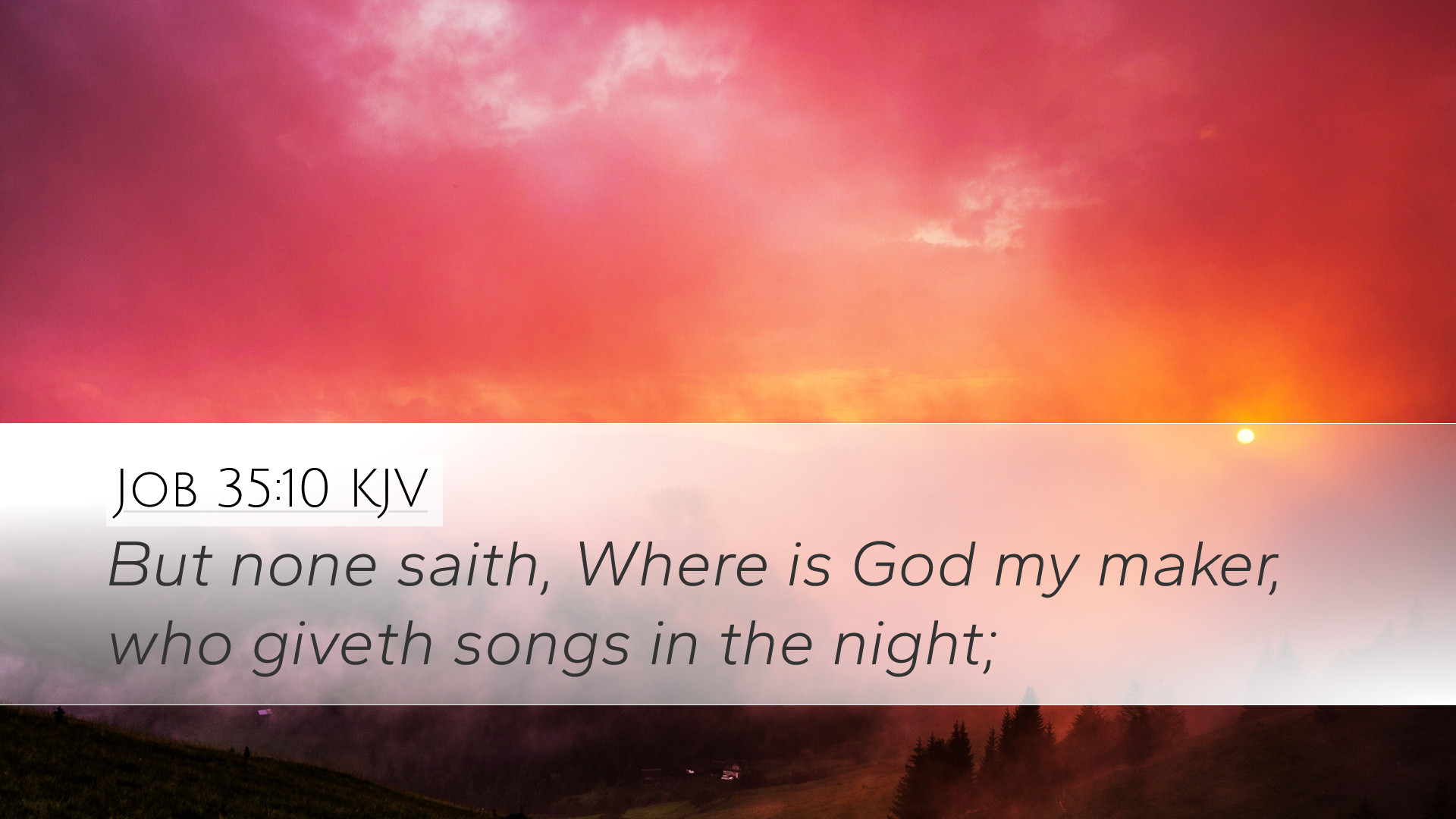Old Testament
Genesis Exodus Leviticus Numbers Deuteronomy Joshua Judges Ruth 1 Samuel 2 Samuel 1 Kings 2 Kings 1 Chronicles 2 Chronicles Ezra Nehemiah Esther Job Psalms Proverbs Ecclesiastes Song of Solomon Isaiah Jeremiah Lamentations Ezekiel Daniel Hosea Joel Amos Obadiah Jonah Micah Nahum Habakkuk Zephaniah Haggai Zechariah MalachiJob 35:10
Job 35:10 KJV
But none saith, Where is God my maker, who giveth songs in the night;
Job 35:10 Bible Commentary
Commentary on Job 35:10
Job 35:10 states: "But none saith, Where is God my Maker, who giveth songs in the night." This verse presents significant theological and practical implications, revealing human tendencies to overlook divine presence during times of trouble.
Contextual Overview
The Book of Job grapples with profound questions of suffering, divine justice, and human righteousness. Throughout this narrative, Job's friends attempt to explain his suffering by attributing it to the punishment for sin. However, Job maintains his innocence and seeks a deeper understanding of God's purpose.
Insights from Commentators
Matthew Henry
Matthew Henry emphasizes the spiritual and emotional struggles that humans face, particularly in suffering. He notes that in times of distress, people fail to cry out to God as their Creator. Instead of seeking Him, they often resort to blaming fate or circumstances. Henry points out that God, who is our Maker and sustainer, should be our first recourse in times of trouble.
- The Nature of God: Henry suggests that recognizing God as our Maker prompts us to reflect on His role in our lives, and how He provides "songs in the night," which signify comfort and hope amid despair.
- The Human Condition: The commentary outlines a poignant truth: the failure to turn to God is endemic to humanity. Spiritual blindness often leads us into further despair when we should be seeking restoration and solace from the Creator.
Albert Barnes
Albert Barnes provides a more analytical approach, delving into the text's implications for understanding suffering and God's presence. He highlights the stark contrast between divine omnipotence and human frailty. Barnes argues that mankind often neglects to ask the vital question, "Where is God?" during times of distress, which reflects a deeper existential crisis within the soul.
- God's Presence in Adversity: Barnes elucidates that while we may not see God at work, His presence remains constant. The "songs in the night" symbolize God's assurance and the hope He provides, reminding believers of His continuous involvement even in silence.
- Call to Awareness: He urges readers to cultivate an awareness of God’s active role, suggesting that seeking God in trying times is crucial for personal spiritual growth and understanding.
Adam Clarke
Adam Clarke offers a more didactic take on the verse, framing it within the broader questions of human suffering and the divine. He articulates the necessity of recognizing God as the ultimate source of peace and joy, especially during "night" seasons of life.
- The Divine Composer: Clarke posits that God gives "songs in the night" as a metaphor for divine intervention; He offers comfort and joy that transcends the circumstances. This highlights God's role as a provider of emotional and spiritual sustenance.
- Encouragement to Seek: Clarke encourages individuals to actively seek God during times of suffering, reflecting on the importance of maintaining a relationship with the Creator even when feelings of abandonment arise.
Theological Implications
This verse challenges believers to reflect on their relationship with God during hardship. The question "Where is God?" becomes not just an inquiry about God’s physical presence, but rather an invitation to explore the depths of faith. It provokes deeper introspection regarding our responses to divine silence and human suffering.
Practical Application
For pastors and theologians, Job 35:10 serves as a reminder to guide their congregations in recognizing God's sovereignty and comfort during hardships. It encourages the preaching of God's active presence, particularly in emotional and spiritual realms.
Students of the Bible are urged to engage with the text deeply, exploring the nuances of human suffering, creation, and the role of God as the Sustainer and Comforter. Reflexive questions should be posed in study groups to facilitate meaningful discussions on faith and adversity.
Conclusion
Job 35:10 encapsulates a spiritual truth relevant across time: in the face of suffering, God remains a steadfast beacon of hope. The insights from Matthew Henry, Albert Barnes, and Adam Clarke collectively underscore the importance of seeking God as our Maker during the darkness, reminding us that even in silence, He offers songs that sustain our spirits.


